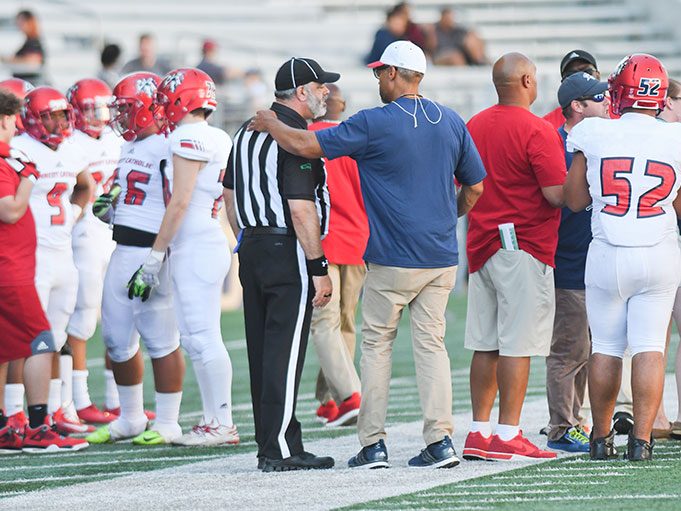When an official works multiple sports, care needs to be taken as to what words or actions cross the line of emotion versus abuse. At the same time, however, there are universal principles across all sports that officials should follow when deciding whether or not to assess a penalty for abuse of officials.
Here are some guidelines for differentiating an emotional tirade from a personal attack:
1. The use of the word “you.”
When a player or coach references a previous call (or non-call) that you made in a less-than-pleasing tone of voice, it’s safe to assume that he or she is displeased at the decision you have made. If the player or coach yells loud enough for you to understand what he or she is saying, pay careful attention to the words being used. In particular, be aware of this magic word: “you.” When the words “you” or “you’re” are used in regard to your officiating performance, it’s time to step in and warn the player or coach that personal comments are not going to be tolerated. Depending on the severity of the comment, you may go straight to a technical or unsportsmanlike conduct penalty. It’s important to understand the intent of the coach or player when making a decision like this. Which brings us to the next point.
2. Firing up the team?
Quite often, a coach takes a decision made by an official and uses it to light a fire under his team. We see this in professional sports when the head coach argues a call and puts on a show of his displeasure. This illustrates to his team — and even to the fans — that he is invested in the team’s performance and success. As an official, understanding a coach’s personality is critical to determining whether an argument is aimed at putting you down or pumping up his team. You know a coach has stepped over the line when the expression on his face turns from frustration to straight anger. When I get a coach going off on a call I made, I will take a good look at his posture, demeanor and the words he or she is using. If he or she has not made any personal remarks to me or my crew, I will give a quick hand signal and verbally indicate that the show is over. If the coach feels the show must go on, assess the proper penalty.
3. Mad at the call, or mad at the sweater?
In my opinion, we let players and coaches get away with too much verbal abuse. Anytime a personal comment is made that is a direct attack toward the official, a penalty must be called. We are reprimanded for making lewd comments toward game participants, and we need to do the same for comments directed toward us. This is a two-way street. Players and coaches will become upset with calls that go against their team, but when that frustration turns personal, that is when we need to step in and take action. If we don’t, we let the participants control us instead of the other way around. We then leave the next crew working the same team to clean up the mess we left for them. Verbal abuse that is personal should never be tolerated. That’s why we have rules that deal with such comments.
4. Take control.
There will be some games when you feel like everyone is against you. Many officials complain about the abuse they take throughout the course of a game. Why do players and coaches verbally abuse officials? My easiest answer: because we let them! If during a game you feel like the participants are going south, you need to immediately get out of that spiral and be stern and direct with the coach. Tell him that his players’ conduct has crossed the line and you are prepared to assess the appropriate penalties to anyone else who crosses the line. This is where thick skin comes into play. Sometimes the calm, cool and collected approach doesn’t work. You need to clearly let somebody know when they are about to cross the line and put the ball in their court. If they continue, you can then assess a penalty because you have already warned them.
When it comes to verbal abuse, always remember that all players and coaches have a responsibility to act in a sportsmanlike manner at all times. If you are able to skillfully talk a player or coach out of taking a penalty, that is good. If you are not, that’s why your league provides a section in the rulebook dedicated to you, the official. Use it well.
What's Your Call? Leave a Comment:
Note: This article is archival in nature. Rules, interpretations, mechanics, philosophies and other information may or may not be correct for the current year.
This article is the copyright of ©Referee Enterprises, Inc., and may not be republished in whole or in part online, in print or in any capacity without expressed written permission from Referee. The article is made available for educational use by individuals.

















